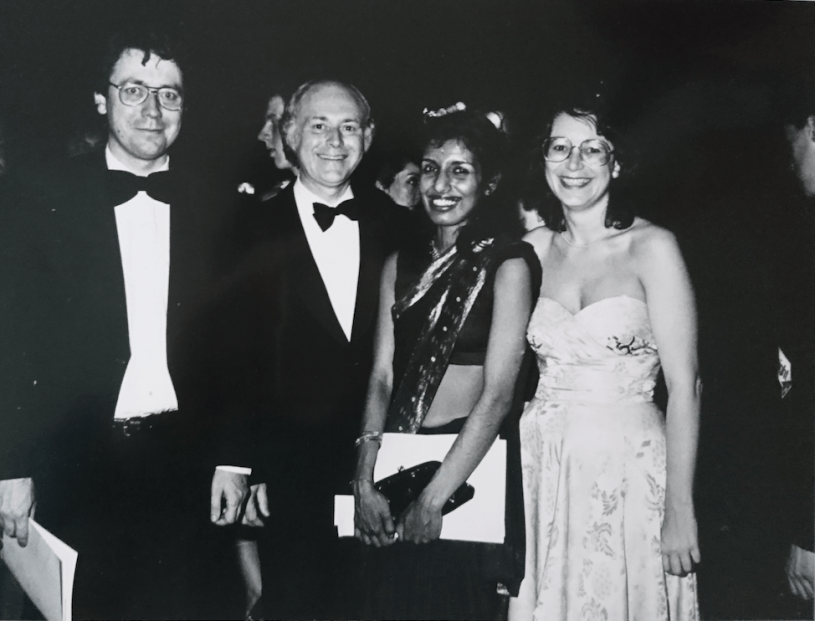(L-R) Scott Murray, John B. Murray, his second wife Annie and daughter Sue.
John B. Murray, one of the pioneers of the modern Australian cinema, died yesterday in Melbourne after a massive stroke. He was 88.
The writer/producer/director and distributor was one of the guiding lights of the industry from the 1960s.
He was the first director of the Film, Radio and Television Board at the Australian Council for the Arts, which later became the Australia Council and subsequently was transferred to the Australian Film Commission when it was established in 1975.
Former Australian Film Commission CEO Kim Williams tells IF: “He made a very substantial contribution and should be remembered especially for his courage in establishing the early video access centres around the country.
“He also got the the Chauvel and Longford cinemas going in Sydney and Melbourne under the then AFI, with their Australian programming and as venues for documentaries and international films of note.
“His remarkable work in self-distributing The Naked Bunyip around the country showed courage and persistence and was instrumental in starting the move for serious change in censorship.”
Released in 1970, comedy-documentary The Naked Bunyip starred Graeme Blundell as a shy young man who is hired by an ad agency to conduct a survey on sex in Australia. The clueless young man investigates homosexuality, transvestites, prostitution, and strip clubs along with every other variant on the “norm.”
Murray directed and co-wrote the script with Ray Taylor. Barry Humphries played Edna Everage.
He worked as a fitter and turner before opening a women’s wear shop in East Ivanhoe and was then hired as a set decorator at the ABC in Elsternwick.
There, he worked on the acclaimed documentary television series Alcheringa about Aboriginal life prior to the arrival of Europeans.
He went on to direct such documentaries as It’s Rice: Australian and the AFI Silver Award-winning Yoga and the Individual.
In 1969 he served as an associate producer on Tim Burstall’s Two Thousand Weeks, a pioneering attempt to make an Australian film inspired by the great film works of art from Europe in the 1960s.
For a while he was head of the Victorian chapter of the Producers & Directors Guild of Australia. With Christopher Muir he persuaded the Guild and Southern Cross Films to finance the four-part feature Libido in 1973. John directed one episode and David Baker, Tim Burstall and Fred Schepisi did the others.
After collaborating with Phillip Adams on The Naked Bunyip he joined Adams Packer Film Productions to make a series of major Australian films including Paul Cox’s Lonely Hearts.
He quit Adams Packer after a creative dispute over Igor Auzins’ We of the Never Never.
In 1986 John produced and his son, filmmaker and journalist Scott Murray, wrote and directed Devil in the Flesh, based on novel Le diable au corps by Raymond Radiguet.
When the French distributor decided to recut the film although it had been selected as the first Australian film to screen in Critics Week at the Cannes Film Festival, John flew to Paris, enlisted the support of the French Director’s Guild, took the distributor to court and won.
John would later lobby hard for moral rights legislation in Australia to protect the rights of artists, which was successfully passed in 2001.
Among his last works as producer-director was The Plight of Tibet and the Dalai Lama. Broadcast on the ABC in 2000, the documentary showed the Dalai Lama, other monks, nuns and laymen describing the imprisonment without trial of Tibetans, their subsequent torture and sometimes death.
In the past six months he was busily digitally restoring a large number of his feature films and documentaries.
Scott and his sister, producer Sue Murray, will complete that work in collaboration with Malcolm Richards, MD of Cameraquip Australia.
Survivors also include his daughter Shahaan.


